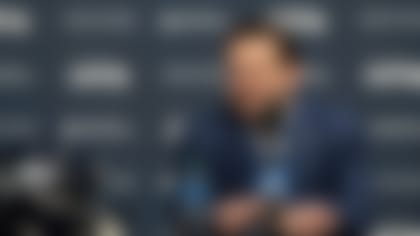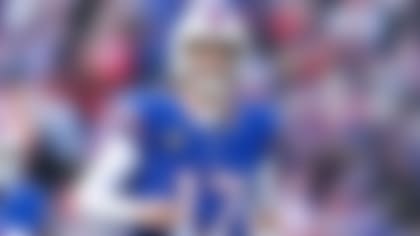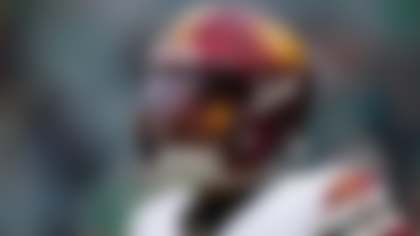The much-anticipated release of JaMarcus Russell concludes a disappointing three-year run in Oakland that appeared doomed from the start.
The former No. 1 overall pick was selected by Oakland against the reported wishes of then head coach Lane Kiffin, and he missed all of his rookie training camp before signing a six year, $61 million contract after the first week of the season.
Without the opportunity to acclimate to the pro game during structured practices and preseason games, Russell was playing catch-up from the start. He was so far behind in learning the team's playbook that he played in only four games during his rookie season, and registered his lone start in the season finale against the San Diego Chargers.
Given a full training camp with the team, Russell showed signs of promise in 2008, as he compiled a respectable 77.1 passer rating and threw 13 touchdowns with eight interceptions. He finished the season with a solid three-game stretch that saw him toss six touchdowns and only two interceptions in leading the Raiders to victories in two of their last three contests.
Russell failed to capitalize on the momentum generated at the end of that season, however, when he reported to training camp overweight and out of shape. That poor display of leadership coincided with growing concerns about his work ethic and study habits. As the face of the franchise, Russell was expected to set the tone by being one of the Raiders' hardest workers, but too often he was the last one in the building and the first one out.
Although Russell deserves most of the blame for his on-field failures, the organization is also responsible for his underachievement. Oakland cycled through at least three different play-callers during his tenure (Kiffin, Greg Knapp and Tom Cable), and the lack of consistency resulted in game plans that failed to accentuate Russell's strengths.
In addition, the team never surrounded him with a legitimate No. 1 receiver. Javon Walker, Darrius Heyward-Bey, Johnnie Lee Higgins, Chaz Schilens and Louis Murphy don't strike fear in the minds of many defensive coordinators, and their inability to create space in the passing game forced Russell to repeatedly toss the ball into tight windows.
The Raiders' lack of playmakers was also compounded by poor pass protection from the offensive line. Russell frequently took a pounding at the hands of pass rushers off the edge, and he too often turned the ball over when hit from the blindside. Ball security clearly falls on the quarterback, but keeping the pocket clean would definitely have prevented a number of miscues made by the young signal caller.
Now that the Raiders have turned him loose, Russell must shed the excuses for his poor play, and commit to fulfilling the promise that most forecasted for him when he was considered the consensus choice as the top pick in the 2007 draft. This means that he must get down to a manageable weight (250 pounds) that will allow him move around better in the pocket. He must also decide that playing the game is important to him, and take the time to study and prepare like the great ones. Peyton Manning, Drew Brees and Tom Brady are known for their meticulous attention to detail in practice and the classroom, and Russell must adopt some of those traits to taste success in the NFL.
If he can start to exhibit some of those characteristics over the next few months, he will find plenty of suitors willing to take a chance on his outstanding physical gifts. Although he has emerged as the poster boy of NFL flameouts, the league has a shortage of quality quarterbacks, and some quarterback guru will look forward to the opportunity to enhance his reputation by molding Russell into a solid player.
While that statement will surely elicit eye rolls from some readers, there are several teams that are ideal fits for Russell's skill set (excellent arm strength and proto-typical size for the position). Teams like the New England Patriots, Cincinnati Bengals, New Orleans Saints and San Francisco 49ers come to mind because they feature vertical passing games, and have well-respected head coaches and solid teachers in place as offensive assistants.
Cincinnati has successfully rehabilitated the careers of several troubled players, including Cedric Benson and Tank Johnson, and they could use a young quarterback on their roster to develop. Plus, the team has the weapons in place that would alleviate some of the pressure on him to function as the driver of the offense.
In New England, he would not only join a strong locker room that could show him how to be a pro, but their shotgun-heavy system is similar to the offense that he directed in college. In addition, he would enjoy the luxury of learning from Tom Brady. Observing one of the top quarterbacks in the game on a daily basis will provide Russell some of the mentoring that he desperately missed during his time in Oakland. Furthermore, he would operate under a head coach known for melding his system to the talents of his players.
The legend of JaMarcus Russell will be synonymous with some of the more notable busts in the draft, but history suggests that he will definitely get another shot in the league.
David Klingler, David Carr, Tim Couch and even Ryan Leaf received second chances, so expect to see Russell on a sideline this season. What he does with it will ultimately tell us if Russell was ever worth the hype that accompanied his arrival.




